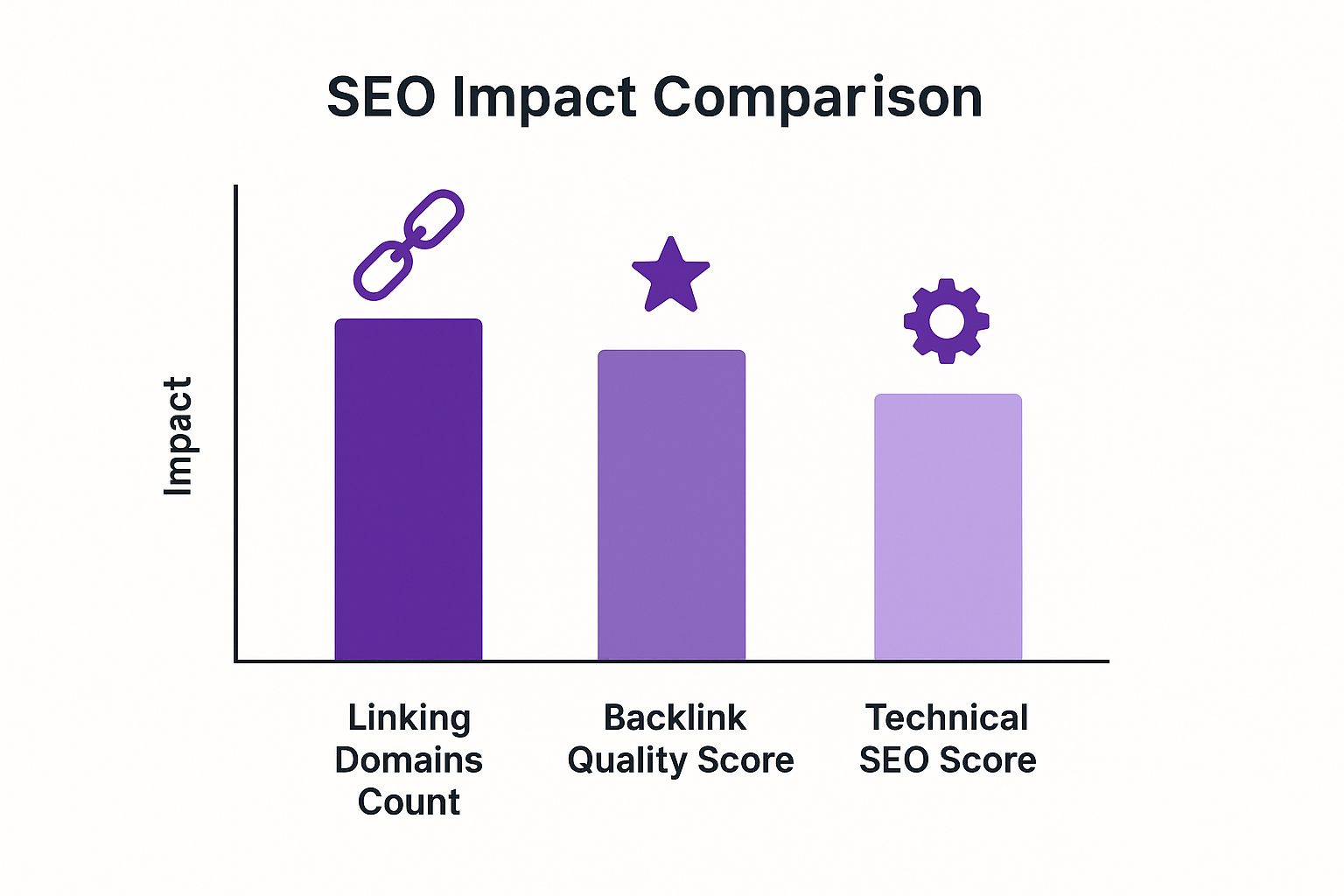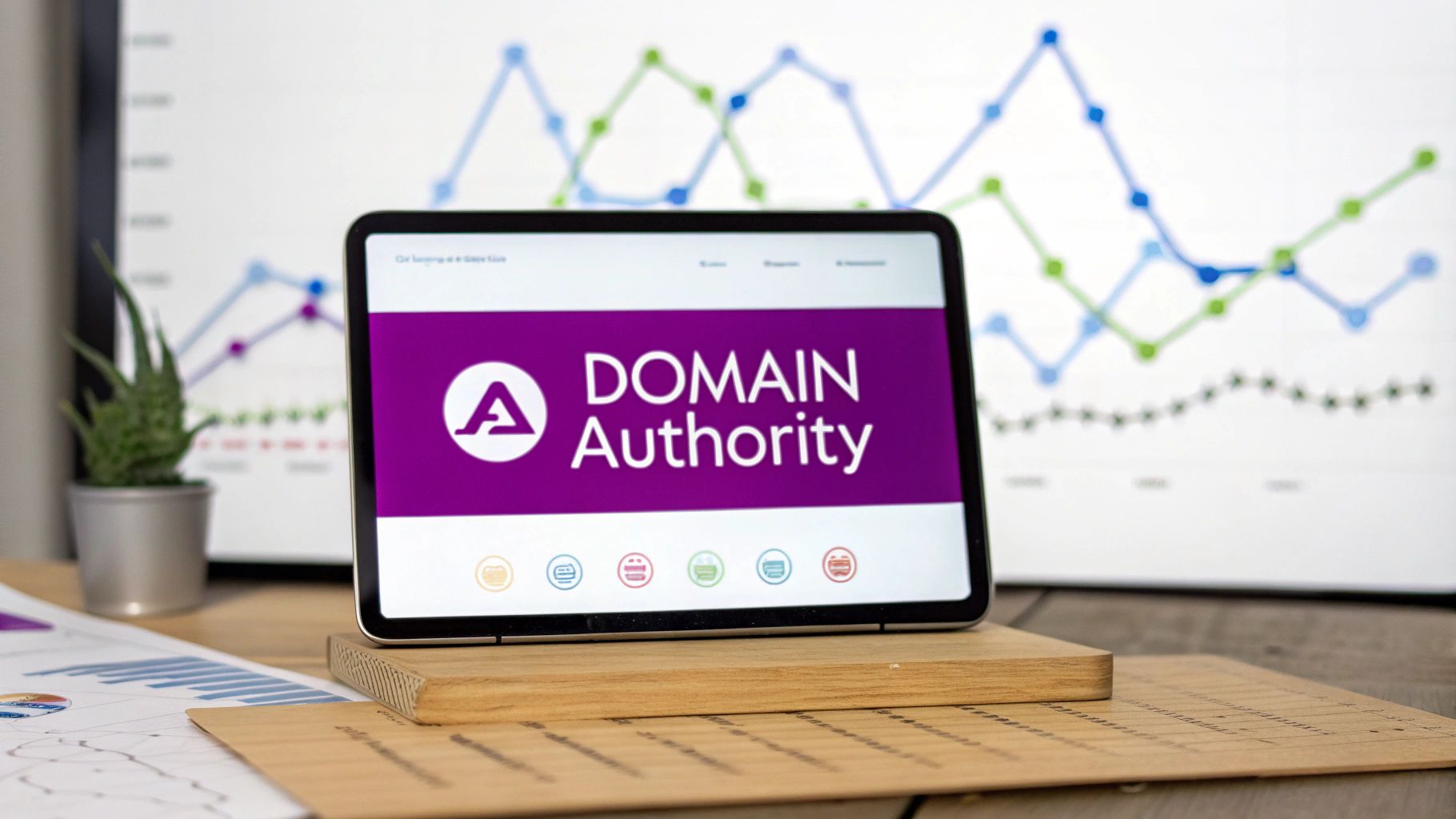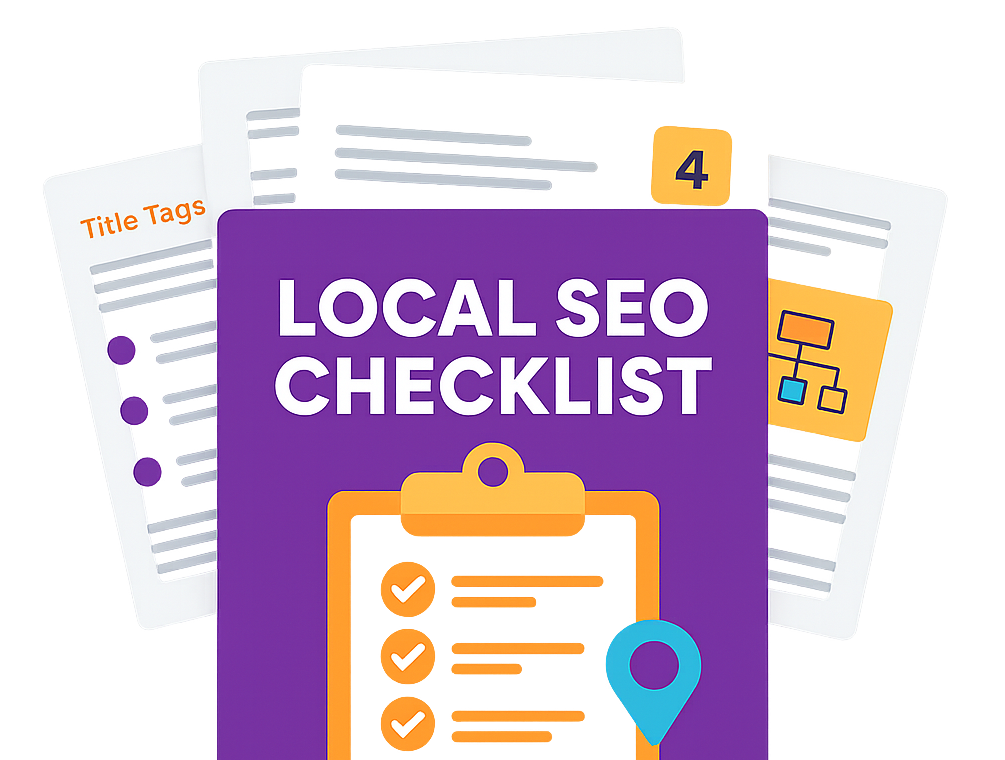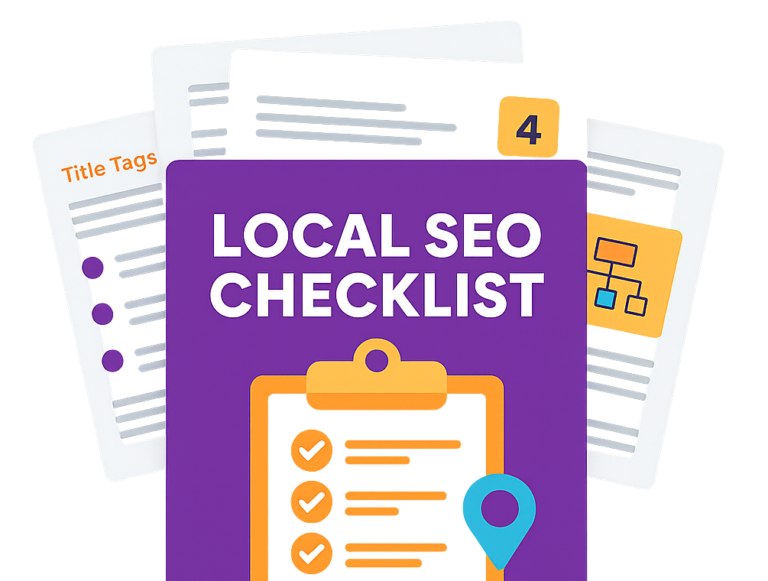If you’ve spent any time in the world of SEO, you’ve probably heard the term Domain Authority thrown around. Often called DA, it’s a score ranging from 1 to 100 that predicts how likely a website is to rank well on search engine results pages.
Think of it as a kind of reputation score for your website. The higher the number, the stronger your site’s perceived authority is, and the better its chances of landing one of those coveted top spots in Google.
What Is Domain Authority?

Let’s use an analogy. Imagine your website is in a massive popularity contest, and search engines are the judges. In that contest, Domain Authority is like a predictive poll showing who’s most likely to win.
It’s important to remember that this isn't an official ranking factor from Google. Instead, it’s a powerful metric created by the SEO software company Moz to help us make sense of a website's strength.
DA is calculated using dozens of signals, but the most important one by far is a website's backlink profile—that is, the quality and number of links pointing to it from other sites. A single link from a highly trusted source, like the BBC, is a huge vote of confidence that significantly boosts your site's perceived authority.
To help you get a quick handle on the concept, here’s a simple breakdown.
Domain Authority at a Glance
The table below summarises the core components of Domain Authority.
| Concept | Brief Explanation |
|---|---|
| What It Is | A predictive score from 1 to 100 that gauges a website's ranking potential. |
| Who Created It | The SEO software company Moz. |
| How It's Calculated | Based on dozens of factors, mainly the quantity and quality of backlinks. |
| Is It a Google Ranking Factor? | No, but the elements that build a high DA are what Google values. |
| What It's Used For | Benchmarking against competitors and prioritising SEO efforts. |
Domain Authority essentially gives us a reliable shorthand for understanding a site's overall SEO health and competitive strength.
Why Does DA Matter?
So, if Google doesn't use DA directly, why should you care? Because the things you do to improve your Domain Authority are the very same things that Google does care about. A high DA is simply a byproduct of a solid, well-executed SEO strategy.
It helps you:
- Benchmark your site against competitors to see where you really stand.
- Predict ranking potential for the keywords you’re targeting.
- Prioritise your SEO efforts by showing you where to focus your energy.
For businesses here in the UK, understanding your DA is crucial. While Moz doesn’t offer a UK-specific score, the metric is universally used by SEO professionals to gauge a website's strength in a seriously crowded market. With over 9.7 million .uk and .co.uk domains registered, a strong DA is what helps you cut through the noise.
Key Takeaways
The core idea is simple: a website with a high DA is seen as more credible and authoritative, which gives it a major leg up in the search rankings.
It's a comparative metric. Your goal isn't to hit some magic number like 100, but rather to build a score that's stronger than your direct competitors.
A high Domain Authority score is the result of earning trust over time. It reflects a healthy, well-regarded backlink profile, which is a key signal that search engines use to determine a site's value and relevance.
Improving your score boils down to a consistent strategy focused on earning high-quality backlinks. To get a head start, check out our guide on how to build backlinks for some practical, actionable techniques.
How Your Domain Authority Score Is Calculated
Ever wondered what’s actually in a Domain Authority score? It’s not just a number plucked out of thin air. It’s the result of a seriously complex machine learning algorithm built by Moz, designed to predict how well your website will rank on search engines.
At its core, the calculation boils down to one key ingredient: your website's link profile. Think of every link pointing to your site as a little vote of confidence. Moz’s algorithm sifts through all these "votes" to figure out just how trustworthy and authoritative your website appears to be.
But here’s the thing: not all votes are created equal. This is the most important part to grasp if you want to understand your DA score.
The Power of Linking Root Domains
The single biggest factor is the number of linking root domains. That’s just a fancy way of saying how many unique websites are linking to you. Getting ten links from ten different websites is a world away from getting ten links from the same site.
Why? Because each new domain that links to you is another independent vote of confidence. It tells the algorithm that your content is being recognised across different corners of the internet, which is a massive signal of broad appeal. Diversity is everything here.
Of course, quantity is only half the picture. The algorithm is far more interested in the quality of those websites linking to you.
A single backlink from a high-authority, trusted website like a major news outlet or a .gov.uk site can have a greater positive impact on your Domain Authority than hundreds of links from low-quality, unknown blogs.
This is where the idea of link equity comes in. When a powerful website links to you, it passes on some of its own authority—its "link juice," as we often call it. It’s like getting a glowing recommendation from a highly respected industry expert versus a casual nod from a stranger. The expert’s endorsement carries far more weight and does a lot more to build your reputation.
Quality and Trust Trump Everything
Moz’s algorithm is smart. It doesn’t just count links; it evaluates the overall health and quality of your entire backlink profile by looking at a massive index of the web to see how links flow between sites.
The core principles it cares about are pretty straightforward:
- Trust: Are the sites linking to you reputable? Or are they spammy and untrustworthy? Links from domains with high trust scores give you a serious boost.
- Relevance: Do the websites linking to you operate in a similar industry or cover related topics? A link from a relevant site is a powerful signal of your authority in a specific niche.
- Popularity: It’s not just about the site linking to you, but who links to them. A link from a popular, well-regarded site that everyone else links to is a huge endorsement.
Ultimately, the DA calculation is a holistic assessment. If you're looking to build a strong link portfolio, exploring different off-page SEO strategies is the perfect next step. By focusing on earning links from a diverse range of high-quality, relevant sources, you’re feeding the algorithm exactly the signals it wants to see, which will lead to a stronger Domain Authority score over time.
Why Domain Authority Is Crucial for Your SEO Strategy

It’s one thing to know what Domain Authority is and how it’s calculated, but the real magic happens when you apply it to your business goals. DA isn't just another number to obsess over; it’s a powerful strategic tool that gives you a clear roadmap for your search engine optimisation (SEO) efforts. It helps you stop guessing and start making data-driven decisions that deliver tangible results.
Ultimately, a strong DA score signals a healthy, authoritative website, which has a direct link to achieving your core business objectives. It helps build a solid foundation for sustainable growth, beefs up your brand credibility, and secures a stronger online presence in a competitive market like the UK.
Benchmarking Against Your Competition
One of the most practical ways to use Domain Authority is for a bit of good old-fashioned competitive analysis. It gives you a straightforward yardstick to measure your website's strength against others in your field. By comparing your DA score to your direct competitors, you can see exactly where you stand in an instant.
Are you trailing behind, holding your own, or leading the pack? This insight is invaluable. It helps you set realistic SEO goals and get a sense of the effort needed to start climbing above the competition for the keywords that really matter to your business.
Domain Authority provides a clear, comparative benchmark. Instead of aiming for an arbitrary score, your primary goal should be to build a DA that is consistently higher than your key competitors. This focus ensures your efforts are aligned with winning in your specific market.
Predicting Your Ranking Potential
Let's say you're eyeing up a new keyword to target. DA can give you a pretty good idea of your chances of success. If the top-ranking pages for that keyword all belong to websites with DA scores of 70+ and your site is sitting at a 25, you know you've got an uphill battle on your hands.
This predictive power allows you to be much more strategic with your content and keyword targeting. You can focus your energy on more achievable, long-tail keywords where you have a realistic shot at ranking. This way, you can build momentum before you decide to take on the heavy hitters. It's a smart approach that saves time and resources, making sure your SEO campaign delivers a much better return on investment.
Prioritising Your Link-Building Efforts
Since backlinks are the main ingredient in your DA score, the metric is absolutely essential for guiding your link-building strategy. When you're on the hunt for guest post opportunities or doing outreach, you can use DA to quickly vet potential partner sites.
A smart tactic is to prioritise getting links from websites with a higher DA than your own. These high-quality backlinks pass on more authority—or "link equity"—giving your own score a much more significant boost. Focusing your resources on acquiring a few powerful links is far more effective than chasing dozens of low-quality ones. This targeted approach not only improves your DA but also helps to significantly improve your website traffic over time by associating your brand with other established authorities in your field.
The Key Factors That Influence Your DA Score
To really get to grips with Domain Authority, you need to lift the bonnet and see what’s actually driving your score. While Moz’s algorithm looks at a whole host of signals, a few key factors carry most of the weight. Get these right, and you’re well on your way to building a powerful, authoritative online presence.
The most critical element, by a country mile, is your backlink profile. Think of it like this: every link from another website is a vote of confidence, but not all votes are created equal. A single, powerful endorsement from a highly respected source can be worth far more than hundreds of low-quality mentions. This idea is often called link equity, where authority flows from one site to another through these links.
The Quality of Your Backlinks
The very foundation of a high DA score is the quality of the websites linking to you. The algorithm gives top priority to links from sites that are already seen as trustworthy and authoritative in their own right. This is precisely why a backlink from a major news outlet, a leading industry blog, or a university website can have such a massive impact.
It’s all about trust by association. Earning a link from an established, high-authority site sends a powerful signal that your content is credible and valuable.
The Quantity of Linking Root Domains
While quality is definitely king, quantity still matters—specifically, the number of unique websites (linking root domains) that link to you. Gaining ten links from ten different websites is far more impactful than getting ten links from a single site.
Why? Because it shows your content has broad appeal. It’s a sign that your work is being recognised and valued across different corners of the web, not just within one small echo chamber. A diverse link profile is a hallmark of a healthy, natural, and well-regarded website.
The image below breaks down how these core factors stack up in terms of their impact on your overall DA score.

As you can see, the quality of your backlinks has the biggest influence, with the number of unique linking domains following closely behind.
To give you a clearer picture, some SEO activities will move the needle on your DA much more than others. Here’s a quick comparison of what makes a real difference versus what offers more of a supporting role.
High-Impact vs Low-Impact DA Factors
| Factor | Typical Impact on DA | Example Action |
|---|---|---|
| High-Authority Backlinks | High | Earning a link from a major news site or a top industry blog. |
| Number of Linking Domains | High | Gaining links from 50 different relevant websites. |
| Internal Linking | Low to Medium | Optimising the link structure between your own pages. |
| On-Page SEO (Keywords) | Low | Including target keywords in your title tags and content. |
| Site Speed & Mobile Friendliness | Indirect | Improving Core Web Vitals to enhance user experience. |
| Social Media Shares | Very Low / Indirect | Getting 1,000 shares on a social media platform. |
This table shows that while a solid technical foundation is important, the real game-changers for Domain Authority are high-quality, diverse backlinks. Focusing your efforts there will deliver the most significant results.
Overall Site Health and On-Page Optimisation
Finally, while off-page factors like backlinks are the heavy hitters, your on-page SEO and technical site health create the foundation for everything else. A site that is fast, mobile-friendly, secure, and easy for visitors to navigate is far more likely to earn high-quality links in the first place.
Think of it as having a well-organised, professional shopfront. It naturally encourages high-value partners and industry leaders to want to associate with you.
Strong on-page optimisation doesn't directly boost your DA score in the same way a backlink does. Instead, it makes your website a more attractive destination for other authoritative sites to link to.
By making sure your technical SEO is solid and your content is well-structured, you create the perfect conditions to attract the powerful backlinks that will genuinely improve your Domain Authority. For some targeted tactics to get you started, our ultimate guide to high-authority directory submissions offers practical steps you can take.
Actionable Steps to Improve Your Domain Authority

Alright, so you get what Domain Authority is and why it's a big deal. Now for the fun part: turning that knowledge into a solid game plan.
Improving your DA score isn't an overnight fix; it's a long-term commitment. But if you focus your energy on the right things, you'll build a much stronger, more authoritative website that climbs the search rankings over time.
The whole game boils down to one simple idea: create a website that people genuinely want to link to. That means earning top-notch backlinks while making sure your site itself is a pleasure to use. Let's break down the proven, white-hat tactics that will actually move the needle on your Domain Authority.
Focus on High-Quality Backlink Acquisition
Since your backlink profile carries the most weight in your DA score, this is where you need to put most of your muscle. Forget chasing every link you can get. The goal isn't quantity; it's earning the right links from websites that are relevant and already have a strong reputation.
Here are a few strategies that work:
-
Create Link-Worthy Content: This is non-negotiable. You need to develop resources that are genuinely useful, insightful, or even entertaining. Think in-depth guides, original research, free tools, or eye-catching infographics. When you create something truly valuable, other sites will link to it naturally because it makes them look good.
-
Targeted Outreach and Digital PR: Make a list of websites, bloggers, and journalists in your field who already have a high DA. Don't just spam them; reach out with a personalised pitch, offering them your unique content or expert opinion. A single successful digital PR campaign can land you links on major news sites and the blogs everyone in your industry reads.
-
Guest Blogging: Write articles for other reputable websites in your niche. In exchange, you'll usually get a backlink to your site, either in the content itself or in your author bio. This is a double win: you build links and position yourself as an expert in your field.
Conduct a Thorough Backlink Audit
It’s not just about the links you’re building; it’s also about the ones you already have. A handful of low-quality or "toxic" backlinks from spammy sites can seriously damage your site's credibility and drag your DA score down. This is why you need to audit your backlink profile regularly.
A clean link profile is the foundation of authority. By removing or disavowing harmful links, you're sending a clear signal to search engines that you’re committed to quality and not trying to game their algorithms.
Use SEO tools to sniff out any potentially damaging links. If you find some, the first step is always to contact the site owner and ask them to remove it. If that doesn't work, you can use Google's Disavow Tool to tell them to ignore that link when they crawl your site.
Optimise Your On-Page and Technical SEO
While backlinks are the main event, your on-page and technical SEO are the essential supporting acts. A technically solid, user-friendly website is far more likely to keep visitors around—and, more importantly, to earn those high-quality links you're after.
Here’s what you should prioritise:
-
Improve Site Speed: Nobody likes a slow website. It frustrates users and makes other sites think twice before linking to you. Get in there and optimise your image sizes, use browser caching, and trim down your code to make sure your pages load in a snap.
-
Ensure Mobile-Friendliness: A massive chunk of web traffic now comes from mobile devices, so a responsive design isn't optional anymore. Your website absolutely must provide a smooth experience on any screen size, from a tiny phone to a huge desktop monitor.
-
Strengthen Internal Linking: A smart internal linking structure does two things: it helps search engines understand your site's layout and spreads authority (or "link equity") between your pages. Make it a habit to link from your high-authority pages to other important pages you want to boost.
When you consistently work on these strategies, you create a powerful cycle. A technically sound site with great content starts earning authoritative backlinks. That boosts your Domain Authority, which improves your ability to rank, which in turn helps you attract even more high-quality links.
Your Domain Authority Questions, Answered
Let's cut through the noise and tackle some of the most common questions—and myths—swirling around Domain Authority. Think of this as your no-nonsense FAQ, designed to give you clear, straight answers so you can use DA effectively. We're covering the queries we hear most from UK business owners, so you can walk away ready to track, analyse, and improve your website's authority with confidence.
What Is a Good Domain Authority Score?
Honestly, a "good" Domain Authority score is completely relative. It’s a classic case of “it depends.” Instead of getting fixated on a magic number like 50 or 60, your real goal should be to have a DA score that’s higher than your direct competitors.
For a local business here in Cambridgeshire, a DA of 30 could be fantastic if your rivals are all sitting around the 20-mark. But for a national e-commerce brand, a DA of 50 might be worryingly low if the big players are all at 70 or above. The trick is to see DA as a comparative yardstick to measure your site's clout within your specific industry.
How Long Does It Take to Increase Domain Authority?
Improving your Domain Authority is a marathon, not a sprint. You're building a reputation, and that takes time. The score is built on trust and a strong, natural backlink profile, which simply can't be rushed.
You might notice small ups and downs from month to month, but seeing a real, stable jump in your DA score typically takes anywhere from six months to over a year of consistent, high-quality SEO work. Patience and a steady, ethical approach are non-negotiable if you want to see sustainable growth.
Is Domain Authority a Direct Google Ranking Factor?
In a word: no. Domain Authority is not a metric Google uses in its algorithms. It’s a third-party score created by Moz to predict a website's potential to rank.
That said, the very things that boost your Domain Authority—like earning high-quality backlinks from a diverse range of trusted sites—are exactly what Google’s algorithms love to see. So, while DA isn't a direct factor, a high score is often a strong sign that you’re doing the right things, which naturally correlates with better search rankings.
Can My Domain Authority Score Go Down?
Yes, absolutely. Your DA score can drop, and it’s important to understand why so you don't panic when it happens.
A dip in your score can happen for a few reasons:
- Algorithm Updates: Moz regularly tweaks its index and the formula used to calculate DA. When these updates roll out, scores get recalibrated across the board, which might cause yours to shift.
- Competitor Growth: Remember how DA is relative? If your competitors go on a link-building spree and acquire a load of great backlinks faster than you, their scores will rise, which can make yours look weaker in comparison.
- Toxic Backlinks: If your site starts attracting a lot of low-quality, spammy links, it can dilute your overall link profile and drag your score down.
Watching your DA isn’t just about seeing a number go up. It’s about tracking your competitive position and keeping an eye on the health of your backlink profile over time.
At Bare Digital, we specialise in building the kind of authoritative online presence that gets you noticed. Our bespoke SEO services are designed to improve your rankings and drive real growth. Discover how we can help your business by requesting a free, no-obligation SEO proposal today. https://www.bare-digital.com








